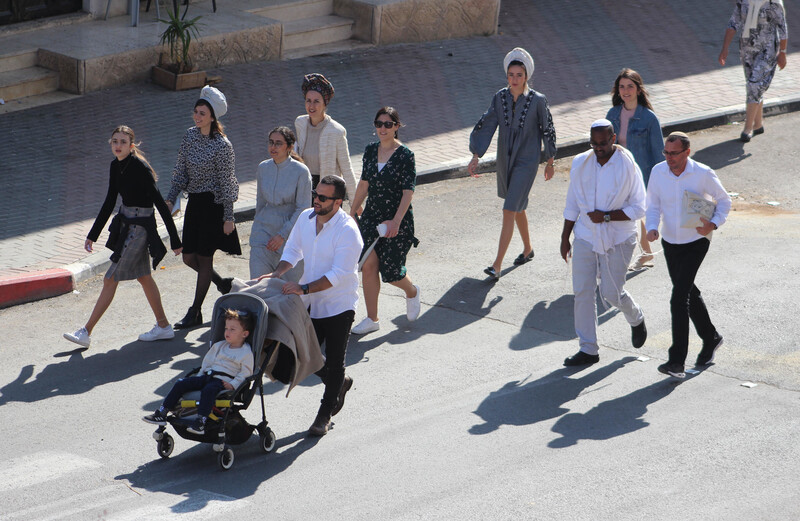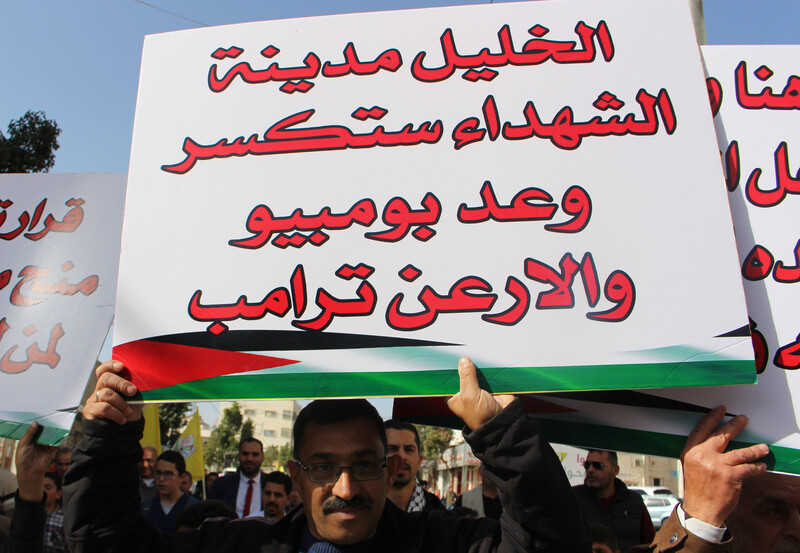A Brief Colonial History Of Ceylon(SriLanka)
Sri Lanka: One Island Two Nations
A Brief Colonial History Of Ceylon(SriLanka)
Sri Lanka: One Island Two Nations
(Full Story)
Search This Blog
Back to 500BC.
==========================
Thiranjala Weerasinghe sj.- One Island Two Nations
?????????????????????????????????????????????????Wednesday, January 1, 2020
Israel to expand colonization of Hebron

A group of Israeli settlers walk through a Palestinian neighborhood in the occupied West Bank city of Hebron on 23 November.
Mosab ShawerAPA images
Miriam Deprez-31 December 2019
Stepping through Checkpoint 56 onto Shuhada Street is like stepping into a different world.
What was once a thriving marketplace and commercial artery for the
ancient city of Hebron is now a ghost street, its only life a few
Israeli soldiers and settlers where shop and home fronts were welded
shut 25 years ago.
Israel shut the street – which leads to the Ibrahimi mosque, known to
Jews as the Tomb of the Patriarchs – to Palestinians after an American
Jewish settler, Baruch Goldstein, massacred 29 Muslim worshippers at the site in February 1994.
Shuhada Street is now the site of a new settlement plan proposed by Israeli defense minister Naftali Bennett, where he intends to construct Jewish-only residential units.
This is only the latest Israeli measure in slicing apart the flashpoint
city and inflating tensions between Palestinians and illegal settlers.
“Shuhada Street and the markets and the mosque is the historical Hebron. It is the city center,” Issa Amro, a prominent local activist against Israeli colonization, told The Electronic Intifada.
“It is the hope for peace for everyone in Hebron because Palestinians don’t forget the 1994 Ibrahimi mosque massacre.”
Palestinians have long been demanding Shuhada be reopened, but their calls have gone unanswered by Israeli authorities.
“People were optimistic in 1997 that the life will come back to the Old
City and the city center of Hebron,” Amro says, referring to an agreement made that year between Israel and the Palestinian Authority to divide Hebron into two zones, H1 and H2.
H1, which constitutes about 80 percent of the city, is administered by the Palestinian Authority in coordination with Israel.
The remaining 20 percent, H2, contains Shuhada Street and the Old City and is under full Israeli military control.
And little there has changed to give Palestinians hope that the market might again reopen, said Amro.
“On the contrary,” he added. “More settlements and more expansion mean
more problems and more violence from the Israeli fanatic settlers who
will come here. We are feeling that we are losing our Palestinian
identity in the area.”
Bennett’s announcement comes in the context of a recent declaration by the US secretary of state, Mike Pompeo, that the Trump administration no longer considers settlements in the occupied West Bank illegal under international law.
“Israel’s decision to build a new illegal settlement in occupied Hebron
is the first tangible result of the US decision to legitimize
colonization,” Saeb Erakat, a senior figure in the Palestine Liberation Organization and the PA, tweeted in the wake of the announcement.
Amro said the policy reversal gave Israel the “green light” to confiscate more land from Palestinians.
“I think it will not be the last,” Amro explained, fearing for the future.
“I think a lot of confiscation [will be] happening in the coming weeks because of the American administration’s decision.”
Settler violence
Several hundred settlers live in H2 in close proximity to the 33,000 Palestinian residents of the area.
Settlers are guarded by a heavy military presence, which Amro says
imposes an apartheid-like system in the city, manifested by separate
laws governing different peoples living in the same place.
“We feel the settlers, they have huge power,” Amro said. “We don’t have
any protection force. I feel that my life is in danger, as a human
rights defender and as a resident in H2.”
Amro said he often fears to leave his home due to settler violence which
Israeli authorities disregard with impunity. The Israeli military has
little power over settlers in the West Bank as they are subject to
civilian law, whilst Palestinians remain under Israeli military law.
Bassam Abu Eisheh, resident and village mukhtar (chief) of the Tel Rumeida neighborhood of the Old City, said life in H2 is getting harder for Palestinians.
“Most of the settlers that live here, they are not originally from here,
they came from abroad, from France, Europe or America,” Abu Eisheh
said, describing many of them as “fanatics and extremists.”
Bennett’s announcement also came amid political deadlock in Israel with
two inconclusive Israeli elections in April and September.

Palestinian holds a banner that reads, “Hebron, the city of martyrs,
will break Pompeo’s promise and reckless Trump,” during protests in the
occupied West Bank city of Hebron on 26 November.
Mosab ShawerAPA images
The Hebron settlement building proposal is slated to double the number
of Israeli settlers in the city. Coming in the context of repeated
Israeli elections, it leaves Palestinians like Abu Eisheh feeling they
are paying the price of Prime Minister Benjamin Netanyahu’s increasingly
desperate bid for re-election.
“Most of the settlers that live here belong to the [ruling party of] Likud, that’s why they come, to get support,” he explained.
In response to the proposal, settlement watchdog Peace Now described settlements in Hebron as “the ugliest face of Israel’s control in the occupied territories.”
“In order to maintain the presence of 800 settlers among a quarter of a
million Palestinians, entire streets in Hebron are closed to
Palestinians, denying them freedom of movement and impinging on their
livelihoods,” the statement continued.
Restrictions
Israel imposes severe restrictions on Palestinians in Hebron that affect
all aspects of everyday life with thousands having to cross military
checkpoints simply to reach their homes.
Restrictions do not exclude emergency services, such as ambulance and fire services.
“We have a lot of people die because you cannot get an ambulance here,”
Abu Eisheh said. Even emergency services require Israeli permits to
cross military checkpoints.
Regardless of checkpoint restrictions, many homes are inaccessible by ambulance, either because an area is blocked by fences, roadblocks or gates.
“Sometimes you have to carry a body out by hand… In several cases, they
die in that area because the ambulance couldn’t get to them,” he
described.
Abu Eisheh believes the Israeli government’s eventual goal is to designate H2 as a Jewish-only area.
“They wish to evacuate the Palestinians from the area to take our
houses, to take our land and to make that area only for them, not
Palestinians.”
